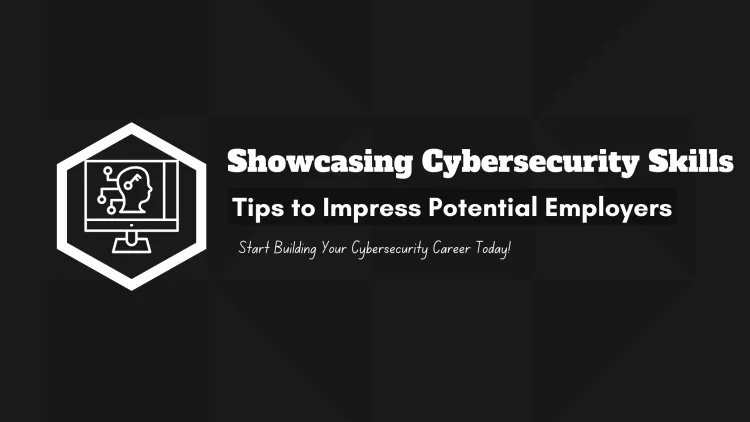How Can I Showcase My Cybersecurity Skills to Potential Employers ? The Complete Guide
This blog explores various strategies to help individuals showcase their cybersecurity skills to potential employers. It emphasizes the importance of building a solid portfolio, earning certifications, participating in Capture The Flag (CTF) competitions, contributing to open-source projects, and networking within the cybersecurity community. Additionally, it highlights the importance of soft skills, staying updated with cybersecurity trends, and building a personal cybersecurity lab to practice. By demonstrating both technical expertise and soft skills, individuals can effectively stand out in the competitive field of cybersecurity.

In the ever-growing field of cybersecurity, standing out to potential employers is essential. With increasing cyber threats, organizations need skilled professionals who can protect their digital assets. But how do you demonstrate that you're the right fit for the job? Whether you're a beginner or have years of experience, showcasing your cybersecurity skills effectively is crucial to landing your dream job. This blog will explore various ways you can highlight your abilities, from practical demonstrations to certifications, networking, and more.
1. Build a Strong Online Portfolio
A portfolio acts as a personal showcase of your skills and accomplishments. It’s the modern-day equivalent of a resume but more interactive and engaging. Here's how you can create a solid cybersecurity portfolio:
Key Elements to Include in Your Portfolio:
- Projects and Labs: Include hands-on projects where you’ve solved real-world security problems. Platforms like TryHackMe, Hack The Box, and OverTheWire provide simulated environments where you can participate in challenges that test your abilities.
- Code Samples: If you have programming skills, showcase code you've written to automate tasks, perform vulnerability scanning, or develop security tools. GitHub is an excellent platform for this.
- Vulnerability Reports: Share any vulnerability assessments or penetration testing reports you've created during internships, bug bounty programs, or personal practice.
- Blog or Content Creation: Writing blogs about cybersecurity trends, best practices, or case studies can establish you as an expert in your field. Platforms like Medium or LinkedIn Articles are ideal for publishing your work.
2. Earn Certifications to Validate Your Skills
Certifications are a powerful way to demonstrate your knowledge and commitment to the cybersecurity field. They provide tangible proof of your skills and enhance your resume. Here are some certifications that potential employers highly value:
- CompTIA Security+: An entry-level certification that covers the basics of cybersecurity and is recognized globally.
- Certified Ethical Hacker (CEH): A certification that proves your skills in penetration testing and ethical hacking.
- Certified Information Systems Security Professional (CISSP): A higher-level certification for experienced professionals, focusing on information security and risk management.
- GIAC Security Essentials (GSEC): A certification for those interested in information security with a broader perspective.
How to Leverage Certifications:
- Display your certifications prominently on your resume and LinkedIn profile.
- Mention the specific skills you gained during the certification process, such as network security, cryptography, or incident response.
- Use certification badges on your digital portfolio to make them more visually noticeable.
3. Participate in Capture The Flag (CTF) Competitions
Capture The Flag (CTF) competitions are a fun and effective way to demonstrate your cybersecurity skills. These competitions involve solving cybersecurity-related challenges, such as cracking encrypted messages, identifying vulnerabilities, or exploiting security flaws in software.
Why CTFs Matter:
- Practical Experience: They provide hands-on experience with real-world scenarios.
- Problem-Solving Skills: You’ll develop critical thinking and analytical skills as you tackle complex challenges.
- Recognition: High scores or victories in CTFs can be shared on your resume or LinkedIn, showing employers your practical skills.
Recommended CTF Platforms:
- Hack The Box
- OverTheWire
- PicoCTF
- CTFTime
4. Contribute to Open Source Security Projects
Contributing to open-source projects demonstrates your ability to work in a team, collaborate on code, and develop security solutions. By working on security-related open-source projects, you can showcase your practical skills and dedication to improving the cybersecurity community.
Popular Platforms for Contributing:
- GitHub: Explore security repositories and contribute by fixing vulnerabilities or adding new features.
- Open Web Application Security Project (OWASP): Contribute to various OWASP projects, which aim to improve security in software development and deployment.
How to Get Involved:
- Identify open-source projects related to penetration testing, network security, or secure coding.
- Start with smaller contributions like bug fixes or documentation improvements before tackling larger tasks.
- Mention these contributions on your resume or LinkedIn to demonstrate your teamwork and technical skills.
5. Network and Build a Personal Brand
Networking is a key strategy for advancing in any career, and cybersecurity is no exception. Building relationships with industry professionals can open doors to new opportunities. Here’s how to effectively network in the cybersecurity community:
Effective Networking Tips:
- Join Professional Groups: Participate in groups like (ISC)², ISACA, and OWASP to stay up-to-date on the latest trends and meet like-minded individuals.
- Attend Cybersecurity Conferences: Conferences like Black Hat, Defcon, and RSA Conference are excellent for meeting industry leaders and learning about new developments.
- Social Media: Use platforms like LinkedIn and Twitter to engage with cybersecurity professionals. Share your thoughts, insights, and accomplishments to position yourself as a thought leader in the space.
- Mentorship: Seek out experienced mentors who can guide you in your cybersecurity career and offer advice on how to improve your skills and increase your chances of getting hired.
6. Demonstrate Soft Skills
While technical skills are critical for a cybersecurity analyst, soft skills such as communication, problem-solving, and teamwork are just as important. Employers look for candidates who can effectively explain complex security concepts to non-technical stakeholders and work well in a team setting.
Soft Skills Employers Value:
- Communication: Ability to explain security risks and mitigation strategies clearly to both technical and non-technical audiences.
- Problem-Solving: Cybersecurity involves identifying and solving problems under pressure, especially during incidents.
- Adaptability: The cybersecurity landscape is constantly evolving. Employers value professionals who can stay current with trends and adapt to new technologies.
7. Stay Updated with the Latest Trends
Cybersecurity is a fast-paced field where new vulnerabilities, exploits, and solutions emerge constantly. Demonstrating that you’re always learning and adapting will show employers your passion for the field and commitment to staying ahead of the curve.
Ways to Stay Updated:
- Follow leading cybersecurity blogs, such as Krebs on Security, Dark Reading, and The Hacker News.
- Subscribe to security newsletters, such as The Daily Swig and Security Weekly.
- Take short courses or webinars on platforms like Coursera, Udemy, and Pluralsight to stay current.
8. Build a Personal Cybersecurity Lab
Setting up a personal lab allows you to practice and experiment with different tools and techniques in a safe environment. Whether it's a virtualized environment on your computer or a dedicated physical lab, having your own testing space demonstrates initiative and a desire to continuously improve your skills.
Essential Tools for Your Lab:
- Wireshark: For packet sniffing and network traffic analysis.
- Metasploit: For penetration testing and vulnerability exploitation.
- Nmap: For network scanning and vulnerability assessment.
- Kali Linux: A distribution packed with security tools for penetration testing and forensic analysis.
Conclusion
Showcasing your cybersecurity skills is not just about listing certifications on your resume. It’s about demonstrating your expertise through hands-on projects, engaging in relevant communities, and constantly improving your knowledge. By building a personal portfolio, participating in CTFs, contributing to open-source projects, networking, and continuously updating your skills, you can effectively showcase your abilities to potential employers. Remember, in the world of cybersecurity, showing practical experience and a proactive approach to learning can often speak louder than any resume.
FAQs
-
Why is building a portfolio important for showcasing cybersecurity skills? A portfolio allows you to showcase real-world projects, hands-on experience, and achievements that demonstrate your capabilities in cybersecurity.
-
What are some beginner-friendly cybersecurity certifications I can earn? Certifications like CompTIA Security+ and Certified Ethical Hacker (CEH) are excellent for beginners looking to validate their knowledge in cybersecurity.
-
How do Capture The Flag (CTF) competitions help improve cybersecurity skills? CTF competitions provide hands-on, practical experience solving real-world security challenges, which improves problem-solving skills and technical knowledge.
-
What open-source projects can I contribute to as a cybersecurity enthusiast? Contributing to projects related to penetration testing, network security, or secure coding on platforms like GitHub and OWASP can help you gain valuable experience.
-
How can I network in the cybersecurity community? Joining professional groups, attending cybersecurity conferences, engaging on LinkedIn, and seeking mentorship are effective ways to network in the cybersecurity field.
-
What soft skills are important for a cybersecurity professional? Key soft skills include communication, problem-solving, and adaptability, as they help in dealing with cybersecurity incidents and explaining complex issues to non-technical audiences.
-
How can I stay updated with the latest cybersecurity trends? Follow blogs, subscribe to security newsletters, and take online courses to stay informed about new vulnerabilities, threats, and tools in the cybersecurity field.
-
Why should I build a personal cybersecurity lab? A personal cybersecurity lab allows you to practice using tools like Wireshark, Metasploit, and Nmap in a safe environment, helping you enhance your practical skills.
-
How do I demonstrate my cybersecurity skills on LinkedIn? Post updates about your certifications, CTF achievements, open-source contributions, and share valuable content related to cybersecurity to build a professional online presence.
-
Can attending conferences and webinars help me showcase my skills? Yes, attending conferences and webinars helps you learn about industry trends, network with experts, and demonstrate your commitment to continuous learning.











![Top 10 Ethical Hackers in the World [2025]](https://www.webasha.com/blog/uploads/images/202408/image_100x75_66c2f983c207b.webp)



![[2025] Top 100+ VAPT Interview Questions and Answers](https://www.webasha.com/blog/uploads/images/image_100x75_6512b1e4b64f7.jpg)







